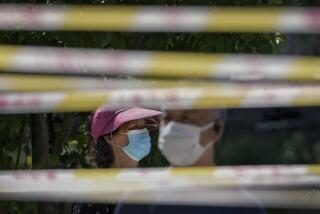WHO, Beijing Differ on Fate of SARS
- Share via
BEIJING — World Health Organization experts pressed China’s government Wednesday to provide more information to its citizens about a virulent strain of pneumonia, even as questions continued about how the government handled the outbreak.
WHO experts met with Chinese Vice Premier Wu Yi, Health Minister Zhang Wenkang and other top officials after a five-day visit to southern Guangdong province, thought to be site of the earliest cases of severe acute respiratory syndrome, or SARS.
The official New China News Agency said Wu expressed confidence that China could eradicate the disease. But WHO’s China representative, Henk Bekedam, told reporters that predicting SARS’ eradication would be premature.
“SARS will be with us for the time being,” said Bekedam, who added that “containment is the major issue” at the moment.
The first cases of SARS were discovered late last year in southern China before spreading to Hong Kong, Singapore, Vietnam, Thailand, Malaysia, Canada, the U.S. and Germany. The virus has killed at least 106 people worldwide -- 55 of them in mainland China -- and has infected more than 2,600, the majority in mainland China and Hong Kong.
China insists that traveling in the country is safe, but WHO officials continue to caution against it.
James Salisbury, an American who taught English, was pronounced dead of SARS on Wednesday when he arrived in Hong Kong from Shenzhen, China, a friend said. The friend added that Salisbury appeared dead when he was placed in an ambulance in Shenzhen, Associated Press reported.
A municipal official denied that the teacher was dead at the time, saying he was in a “serious coma” and died in Hong Kong.
Concern about the spread of SARS unsettled governments across Asia on Wednesday. Malaysia’s government stopped issuing visas to travelers from China. Singapore’s prime minister indicated that the economic fallout from the virus could delay a new administration. In Beijing, residents lined up at pharmacies to buy herbal medicines and face masks. Rumors of school closures and friends stricken by the disease circulated through the capital. Chinese publicity posters showed residents opening windows, getting exercise and talking with physicians.
Some domestic media have faulted the government for its secretive handling of the epidemic. Doubts about official SARS statistics have been heightened by a recent challenge from a senior physician.
In a letter to China Central Television, Dr. Jiang Yanyong, a retired surgeon at the People’s Liberation Army Hospital No. 301, said an elderly couple died of SARS in the hospital in early March, during the annual session of China’s legislature.
He claimed that health ministry officials had told a meeting of hospital leaders not to publicize information about the deaths or about SARS, so as not to trigger social unrest during the legislative session.
Jiang’s letter said that colleagues at another military hospital, No. 309, watched in outrage as Zhang, the health minister, claimed on state television last week that authorities had SARS under “effective control.” Colleagues informed Jiang, 72, that Hospital No. 309 had seven fatalities among 60 SARS patients -- several times the official count. Beijing has so far reported 19 people infected with SARS and four fatalities.
Jiang confirmed the contents of his letter by telephone and said he doubted he would be punished for his allegations. “I don’t think I have anything to worry about, as I was just relating the facts,” he said.
WHO official Alan Schnur suggested that the discrepancy could be due to different reporting systems. Patients suspected of but not confirmed as having SARS may be reported internally, not publicly.
The experts also advised Chinese officials to make available more information about infection control and how to spot travelers with SARS symptoms.
The group praised Guangdong officials for providing information and access. But the WHO officials said they failed to find answers to such basic questions as: Who was the first person infected; was the disease transmitted through animals or humans; and what is the role of so-called super-spreaders, who seem to be able to infect many people?
More to Read
Sign up for Essential California
The most important California stories and recommendations in your inbox every morning.
You may occasionally receive promotional content from the Los Angeles Times.













